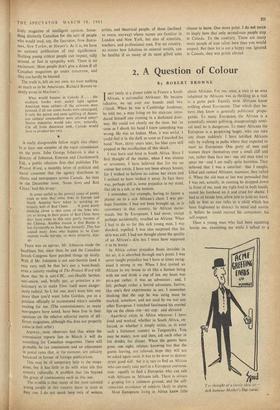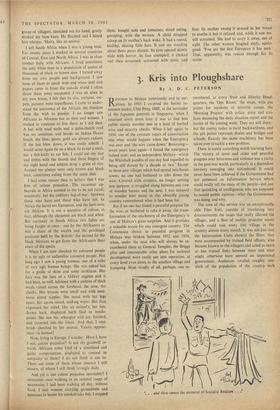2. A Question of Colour By ROBERT BROWNE I MET
lately at a dinner table in France a South African, a nationalist Afrikaner. He became talkative, we sat over our brandy until two o'clock. When he was a Cambridge freshman, he told me, a man living on his staircase intro- duced himself one evening in a darkened door- way. He could not clearly see the man; but 'as soon as I shook his hand I knew something was wrong. He was an Indian. Man, it was awful. could feel it in the dark as soon as I touched his hand.' Now, thirty years later, his blue eyes still popped at the recollection of this shock.
I was born and bred in South Africa. Since I first thought of the matter, when I was sixteen or seventeen, I have believed that for me no colour bar exists. I have not been always honest, for I wished to believe no colour bar exists and I seemed to have wished it away. In fact there was, perhaps still is, some prejudice in my mind, like silt in a tub, at the bottom.
1 remember, for example, having to fasten a plaster on to a sick African's chest. I was per- haps fourteen. I had not been brought up, as is customary in that country, by African nurse- maids, but by Europeans. I had never, except perhaps accidentally, touched an African. When I had to do so for this sick young man, I was shocked. repelled. I was also surprised that his skin was soft. I had not thought about the quality of an African's skin but I must have supposed it to be horny.
In Africa colour prejudice floats invisible in the air, it is absorbed through one's pores. I was never taught prejudice but I have at times recog- nised it strong in me. When I first invited an African to my house to sit like a human being with me and drink a cup of tea, my heart was pit-a-pat rather, it was an adventure: and, I felt, perhaps rather a horrid adventure, furtive, Like one's first experiments in sex. I remember thinking that the cup he was using must be marked, somehow, and not used by me nor any other European. I watched fascinated his everted lips on the china rim—my cup: and shivered.
Apartheid exists in Africa wherever I have lived and worked, whether in South Africa, en- forced, or whether it simply exists, as in even such a fortunate country as Tanganyika. You may be matey, now and then, ask each other in
for drinks, for dinner. When the guests have gone, one sighs, relaxes; knowing too that the guests leaving, are relieved, hope they will not be asked again soon. It has to be done to demon- strate good will : but it is rare to find an African who can easily take part in a European conversa- tion: equally to find a European who can talk with Africans as Africans talk. There is always
a groping for a common ground. and the self- conscious avoidance of subjects likely to alarm. Most Europeans living in Africa know little about Africans. For me, once, a visit to an area inhabited by Africans was as thrilling as a visit to a game park. Equally most Africans know nothing about .Europeans. That which they be- lieve they know is generally politicians' propa- ganda. To many Europeans the African is a potentially sinister golliwog, exasperatingly comi- cal until he is dangerous. To many Africans the European is a perplexing bogey, who can take any shape suddenly. I have terrified Africans only by walking in paths where they expected to meet no Europeans. One party of men and women threw themselves over a small cliff and ran, rather than face me: one old man tried to spear me—and I am really quite harmless. They believed that I was a cannibal: that I caught, killed and canned Africans; mumiani, they called it. When the old man at last was persuaded that I was not, actually, in canning he dropped down in front of me, took my right foot in both hands, rested his forehead on it and cried for shame. I had to sit beside him, allow him to hold my band, talk to him as one talks to a child which has been frightened to distract its mind 'and soothe it. before he could recover his composure, his self-respect.
Once a young man who had been squatting beside me, examining me while I talked to a
group of villagers, stretched out his hand, gently stroked my bare knee. He flinched and I heard him whisper, 'Hairy, like an animal.'
I left South Africa when I was a young man. For twenty years I worked in several countries of Central, East and North Africa. I was in close contact daily with Africans. I lived sometimes the only white man in a population of scores of thousands of black or brown men. I turned away from my own people and background. I saw none of them to speak with and when mail and papers came in from the outside world I often threw them away unopened. I was an alien in my own house, I felt that its size, curtains, car- pets, pictures were superfluous. I came to under- stand the innocence of the African, the freedom from the wish to possess. I no longer saw Africans as Africans but as men and women. I wished to continue to live there as I did then. A hut with mud walls and a palm-thatch roof was my ambition, and beside an Indian Ocean beach, the blue, green, gold sea always radiant. It the hut blew down, it was easily rebuilt. I would never again tie on a black tie to eat a meal, use a fish-knife to eat fish. I could eat my rice and titbits with the thumb and three fingers of my right hand and seldom drop a grain of rice. Around me always were only brown and black men, sometimes eating from the same dish.
I had some reason then to believe that I was free of colour prejudice.. The recurrent up- heavals in Africa seemed to me to be not racial, essentially, but the ordinary tug-of-war: between those who have and those who have not. In Africa the haves are European, and the have-nots are African. It is not a question of colour, in fact, although the chessmen are black and white. But curiously in South Africa two fights are being fought at once: one by the Afrikaners to win a share of the wealth and the privileged positions held by the British : the second by the black Africans to get from the Afrikaners their share of the spoils.
When I am now shocked by coloured people it is by ugly or unfamiliar coloured people. Not long ago 1 saw a young woman, one of a tribe of very ugly human beings. She was naked but for a girdle of skins and some necklaces. Her face was the face of a Gillray negress and it had been, as well, tattooed with a pattern of thick weals raised across the forehead, the nose, the cheeks. Her breasts were small and with enor- mous pitted nipples. She stood with her legs apart, her apron raised, making water. Her face expressed her relief, like an animal's, her lips, drawn back, displayed teeth filed to needle- points. She saw me, whooped with joy, finished, and cavorted into the forest. And that, I mut- tered--shocked by her animal, Yahoo, appear- ance—is human!
Now, living in Europe, I wonder : Have I, have I not, colour prejudice? Is not my goodwill to- wards Africans some kind of a simulated and guilty compensation, displayed to conceal an antipathy to them? I do not think it can be. There are some of them whose absence I still mourn, of whom I still think lovingly daily.
And yet is not colour prejudice inevitable? I remember once walking in an isolated range of mountains:I had been walking all day, without food. I met women carrying groundnuts and tomatoes to barter for smoked lake fish. I stopped them, bought nuts and tomatoes; stood eating, gossiping, with the women. A child strapped asleep on its mother's back woke. It had a round, healthy, shining little face. It saw me standing about three paces distant. Its eyes opened slowly wide with horror, its face crumpled, it choked and then screamed, screamed with panic and fear. Its mother swung it around to her breast to soothe it but it refused and, while it saw me, still screamed. She had to carry it away, out of sight. The other women laughed shyly, apolo- gised. 'You are the first European it has seen.' That, apparently, was reason enough for its terror.







































 Previous page
Previous page